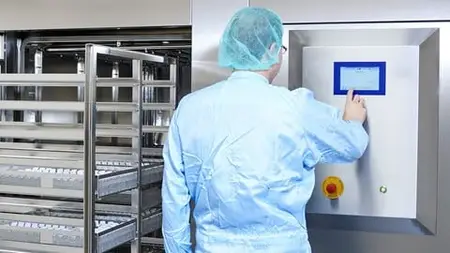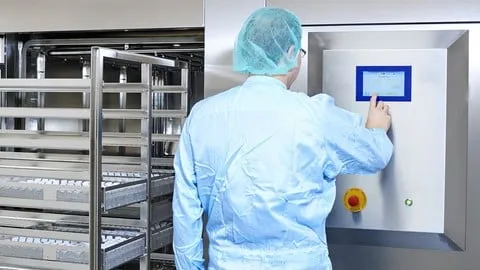Advanced Autoclave Validation: Cycle Failure & Development
Published 8/2025
MP4 | Video: h264, 1920x1080 | Audio: AAC, 44.1 KHz
Language: English | Size: 515.09 MB | Duration: 2h 15m
Published 8/2025
MP4 | Video: h264, 1920x1080 | Audio: AAC, 44.1 KHz
Language: English | Size: 515.09 MB | Duration: 2h 15m
Identify, troubleshoot, and prevent autoclave cycle failures to ensure effective and compliant sterilization
What you'll learn
The science of saturated steam and its role in sterilization.
Steam path assessment and air removal techniques for optimal cycle performance.
How air detectors work and their role in monitoring autoclave efficiency.
Performing Bowie-Dick tests and interpreting results.
Leak testing procedures and troubleshooting common failures.
Identifying and preventing wet loads.
Understanding how material properties affect heat transfer and condensation.
How to choose the right wrapping materials (paper, paper/plastic, Tyvek, Tyvek/plastic).
Best practices for load orientation to ensure full steam penetration.
How to optimize cycle design and parameters for effective sterilization
Requirements
No prior autoclave experience needed — we start from the basics.
Description
Sterilization is one of the most critical processes in pharmaceuticals, medical devices, and healthcare.And at the heart of it stands the autoclave — a powerful, precise, and unforgiving piece of equipment.But here’s the truth:Even the most advanced autoclave can fail to sterilize if validation is poorly done.Incorrect steam quality, wrong load wrapping, or a small orientation mistake can compromise the whole cycle.That’s where this course comes in.Whether you are new to autoclaves or looking to sharpen your validation skills, you’ll learn how to test, verify, and troubleshoot autoclave performance following GMP and international standards like EN 285.With real-world examples, step-by-step demonstrations, and practical tips, this course makes complex concepts simple and immediately applicable.⸻ What You’ll Learn • Fundamentals of autoclave operation and steam dynamics • Differences between saturated, dry, and superheated steam — and why we use saturated steam • The science of steam penetration and condensation • Air removal tests: Bowie-Dick and air detector methods • Load types: porous, liquid, wrapped, mixed • Load wrapping materials: paper, paper/plastic, Tyvek, Tyvek/plastic — and how they affect sterilization • Correct load orientation for maximum steam penetration • Equilibrium time — definition, importance, and how to measure it • How to validate challenging loads (tubing, rubber, metal vs poor heat conductors) • Troubleshooting validation issues like cold spots and poor air removal • Understanding EN 285 and relevant GMP compliance requirements • Writing effective validation protocols and reports⸻ Who This Course is ForThis course is designed for: • Quality Assurance & Validation Professionals in pharma and medical device industries • Microbiologists & Lab Technicians involved in sterilization monitoring • Production Supervisors & Engineers working with sterilizers/autoclaves • Healthcare Sterilization Staff looking to improve process knowledge • Anyone preparing for audits or qualification activities involving autoclaves⸻ Requirements • No prior experience in validation required — we start from the basics • Familiarity with GMP is helpful but not necessary • Access to an autoclave for practice is beneficial (but not mandatory)⸻ Why This Course? • Short, practical, and focused — only the essential knowledge you need • Real-world examples from pharmaceutical and healthcare applications • Validation-focused — perfect for compliance-driven industries • Covers science + application for both beginners and professionals⸻By the end of this course, you’ll understand the science, master the process, and apply the techniques to confidently validate autoclave loads — ensuring safe and compliant sterilization every time.
Overview
Section 1: Introduction
Lecture 1 Introduction
Section 2: Air Removal
Lecture 2 Introduction to Air Removal
Lecture 3 Air Removal Methods
Section 3: Air Detector
Lecture 4 How to detect Air Removal
Lecture 5 What is Air Detector and How it Works
Lecture 6 Air Detector Setup
Section 4: Bowie Dick
Lecture 7 Bowie Dick Test
Section 5: Leak Rate Test
Lecture 8 Leak Rate Test
Section 6: Non-Condensable Gases
Lecture 9 Non-Condensable Gases
Section 7: Equilibration time
Lecture 10 Introduction to Equilibration time
Lecture 11 How to resolve Equilibration time failure
Section 8: Saturated Steam
Lecture 12 Why we use saturated steam in sterilization
Section 9: Steam Path
Lecture 13 What is Steam Path
Section 10: Load Wrapping
Lecture 14 Load Wrapping
Section 11: Load Orientation
Lecture 15 Load Orientation
Section 12: Wet Load
Lecture 16 Introduction to Wet loads
Lecture 17 Guidance and Regulations
Lecture 18 Why wet load is a problem
Lecture 19 What is a wet load
Lecture 20 Causes of wet load
Lecture 21 How to prevent wet loads
Lecture 22 Load Orientation
Lecture 23 Sterile Barrier System
Lecture 24 How to design your cycle
Lecture 25 Wet load investigation
QA/Validation professionals in pharma, biotech, or medical devices,Autoclave operators and sterilization engineers.,Regulatory compliance staff seeking better audit readiness.,Students or professionals aiming to master sterilization and validation techniques.



